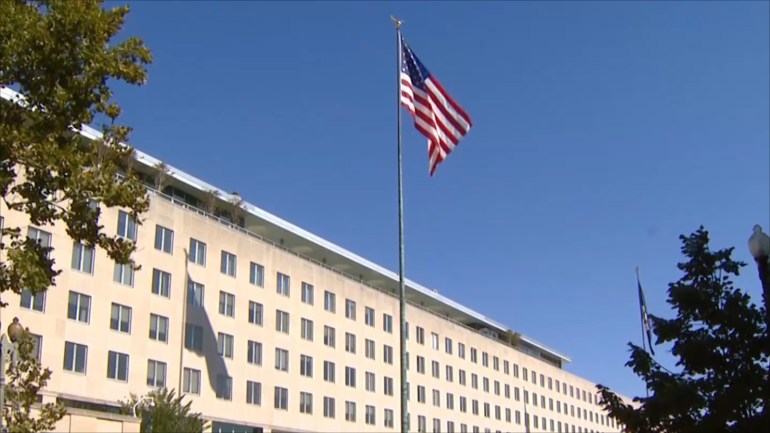Despite the administration of US President Donald Trump's silence for months towards the great development of Egypt's military relations with Russia, there are moves in Congress against Cairo's desire to acquire Russian Sukhoi 35 aircraft, after reports spoke of the proximity of the Egyptian regime to receive these aircraft.
Cairo's acquisition of these planes is expected to provoke great anger in Congress, and it may push the Trump administration to implement the "America's Anti-Sanctions through Sanctions" (CAATSA) and impose sanctions on this Egyptian ally.
American threats - which came from Clark Cooper, the assistant secretary of state for political and military affairs - escalated to say, "The United States may impose sanctions on Egypt and deny it to future military sales if it purchases Russian Sukhoi 35 warplanes."
Members of Congress are outraged that an ally country - which has received billions of dollars in US aid - has purchased weapons from a competing country.
Hence a serious move by 17 members of the Senate from both parties, in the form of a speech by Defense Secretary Mark Esper and State Department Mike Pompeo demanding that they act against Cairo.
Congress passed the Katsa Act in 2017 in a similar measure with the goal of imposing sanctions on US enemies such as North Korea and Iran, but the goal was mainly Russia, its military sales, foreign relations, and specific sectors such as energy, military production, and the financial sector.
The law adopts extensive sanctions against any country that could harm its relations with Russia with US interests.
The law stipulates that the president imposes five or more penalties outlined in Article 231 of the law in relation to a person or entity designated by the president that has participated in an important deal with the defense or intelligence sectors of the government of the Russian Federation or whoever works for it. Trump delegated the Secretary of State, in consultation with the Secretary of the Treasury, the authority to implement Article 231 on September 29, 2017.
A diplomatic source confirmed to Al-Jazeera Net that "Cairo is responding to the American accusations that an agreement with Moscow on the Sukhoi aircraft deal was made before the adoption of the American law, and therefore no sanctions should be imposed on Egypt."
In a similar case, Washington has not yet imposed sanctions on Ankara for the purchase of the Russian S-400 missile system (S 400). Turkey has been removed from the joint F-35 strike program, but this is a separate issue from the sanctions called for by the Katsa Law, and its sanctions can be waived by the President, which has so far happened with Turkey.
Diversification of weapons sources
Charles Dunn, a former official and expert at the Middle East Institute, believes that "Egypt's acquisition of Sukhoi bombers is part of Egypt's distinguished efforts to diversify its weapons sources and modernize its army, as well as to express closer ties with Russia over the past few years."
Dan said - in an interview with Al Jazeera Net - that despite "the threat of both the defense and foreign ministers to impose sanctions under the Casta law, they may refrain from actually imposing sanctions."
On the other hand, the military expert, David de Roche, assistant professor at the Center for Near East and South Asia at the National Defense University, confirmed that there is no need for Cairo to acquire these bombers.
De Roche told Al-Jazeera Net that "combat aircraft, whether Russian, American or European, will not help Egypt to deal with its major security challenges such as terrorist operations in the Sinai, and that more fighters will not help in dealing with the threat posed by the possibility that the Renaissance Dam will lead Ethiopian to reduce the waters of the Nile. "
The military expert believes that Egypt "has enough ships, tanks and combat aircraft, as it cannot effectively use all these weapons, and it does not have trained human competencies yet."
Possible penalties
De Roche believes that, given Egypt's poor human rights record, Cairo's opposition to the United Nations-backed government in Libya, and the continuing accusations of the Democratic Party that Trump is lenient with Russia, "it is difficult to see any positive political trend to waive sanctions against Egypt."
And increases the possibility of imposing sanctions on Cairo, a precedent imposing some carefully calculated US sanctions on sectors within the Egyptian Ministry of Defense that have previously dealt with North Korea in missile production programs.
De Roche stresses that "American military aid to Egypt is not always popular. It is difficult to justify providing the Egyptians with more aid if they use the funds provided by American aid to buy Russian aircraft."
A recent report by the Congressional Research Service indicated that the total amount of aid that Egypt received from the United States exceeded $ 80 billion. The federal budget for 2020 included 1.4 billion aid to Cairo.

